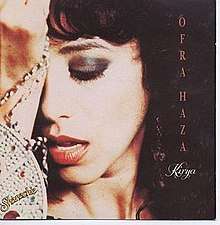Kirya (album)
Kirya (an ancient Hebrew nickname for Jerusalem) was Ofra Haza's 1992 follow-up to the internationally successful Shaday (1988) and Desert Wind (1989). Building on her successful blend of European pop and traditional Middle Eastern sounds, the album was a logical next step for Haza. Musically, it applied the sensibilities of pop producer Don Was to traditional song writing and instrumentation; lyrically, it delivered powerful themes of longing, joy, and the plight of the downtrodden in several languages, much like Haza's earlier work.
| Kirya | ||||
|---|---|---|---|---|
 | ||||
| Studio album by | ||||
| Released | February 25, 1992 | |||
| Recorded | Microplant (Los Angeles), Conway, Devonshire, Record Plant, Bee Studio (Bahia, Brazil) (1991–1992) | |||
| Length | 43:46 | |||
| Label | East West Records, Warner Music Group | |||
| Producer | Don Was, Ofra Haza, and Bezalel Aloni | |||
| Ofra Haza chronology | ||||
| ||||
| Review scores | |
|---|---|
| Source | Rating |
| Allmusic | |
Along with producer Was, Haza was joined by other Western musicians, including a featured duet with Iggy Pop on "Daw Da Hiya", a song about a girl sentenced to death for becoming pregnant out of wedlock while the man responsible remains free. Music videos were made for two of the album's tracks, "Daw Da Hiya" and "Innocent" - "A Requiem for Refugees".
In 1993, the album was nominated for a Grammy[2] in the "Best World Music Album" category,[3] an achievement which to this day has not been matched by any other Israeli singer.
Track listing
- "Kirya" (Traditional, Haza, Aloni) - 6:11
- "Horashoot – The Bridge" (Traditional, Ben Amram, Haza, Aloni) - 3:46
- "Innocent" – A Requiem for Refugees (Haza, Aloni) - 4:46
- "Trains of No Return" (Haza, Aloni) - 4:15
- "Mystery Faith and Love" (Haza, Aloni) - 5:24
- "Daw Da Hiya" (featuring Iggy Pop) (Haza, Aloni, Morriss) - 4:55
- "Don't Forsake Me" (Traditional, Shabazi, Haza, Aloni) - 4:35
- "Barefoot" (Haza, Aloni) - 5:14
- "Take 7/8" (Amram, Haza, Aloni) - 4:35
- "Today I'll Pray" (Bonus track certain editions) (Haza, Aloni) - 4:33
Charts
|
Personnel
- Ofra Haza – lead vocals
- Iggy Pop – vocals/narration
- Harry Hyman Vento – violin
- John Belezikjian – violin
- Tzur Ben-Zelev – acoustic bass
- David McMurray – saxophone
- Professor Ali Jihad Racy – percussion
- Rodrigo Manuel – percussion
- Ed Cherney – background vocals
- Mortonette Jenkins – background vocals
- Natalie Jackson – background vocals
- Marlena Jetter – background vocals
- Valerie Carter – background vocals
- Mark Goldenberg – background vocals, electric guitar, accordion, harmonium
Production
- Don Was – record producer
- Ofra Haza – producer
- Bezalel Aloni – producer
- Recorded at Microplant, Conway, Devonshire, England; Record Plant Studios, Los Angeles, California; Bee Studio, Bahia, Brazil.
References
- Kirya at AllMusic
- Pareles, John (24 Feb 2000). "Ofra Haza, 41, Israeli Pop Singer Who Crossed Cultural Bounds". New York Times. Retrieved 7 May 2019.
- "Ofra Haza". Grammy Awards. Recording Academy. Retrieved 7 May 2019.